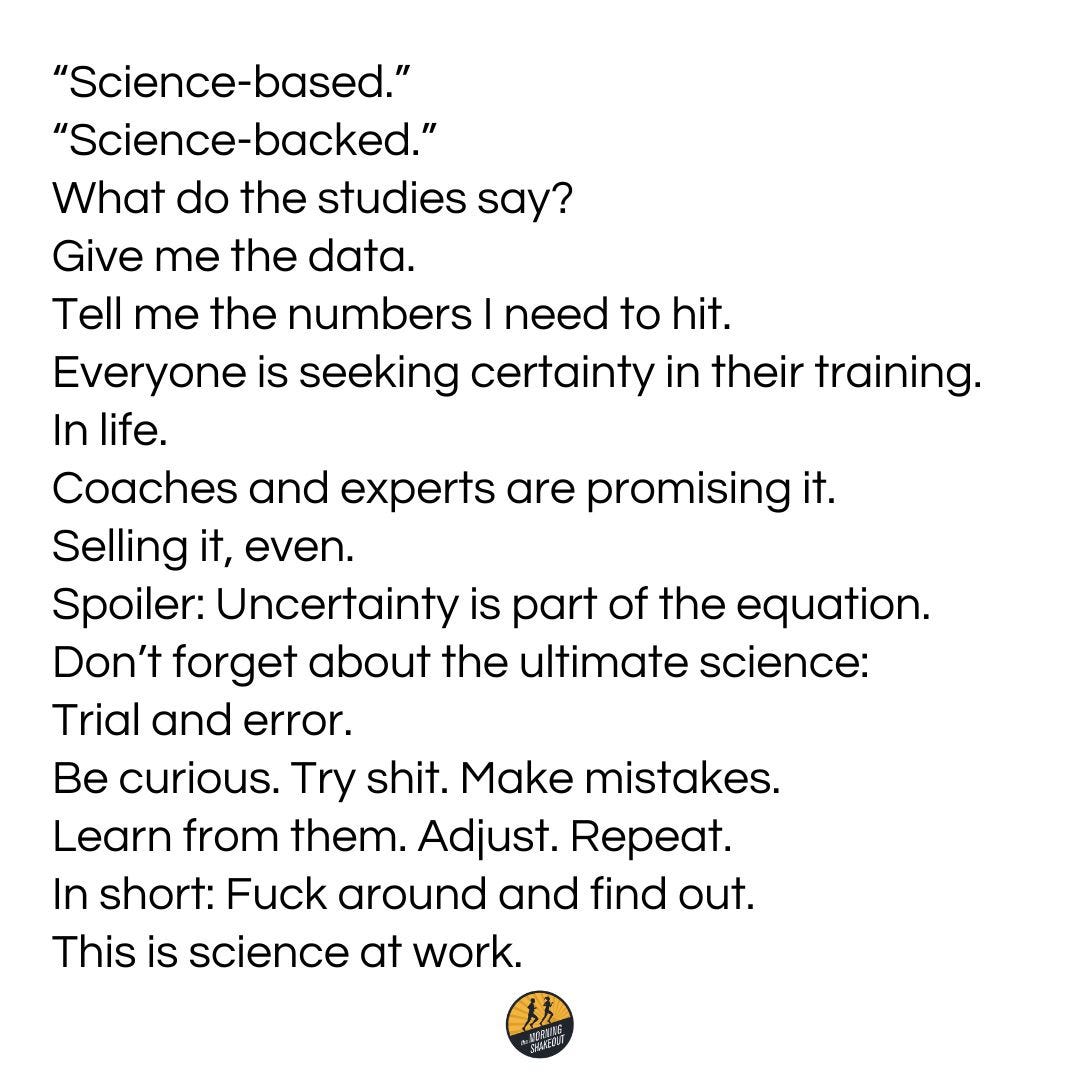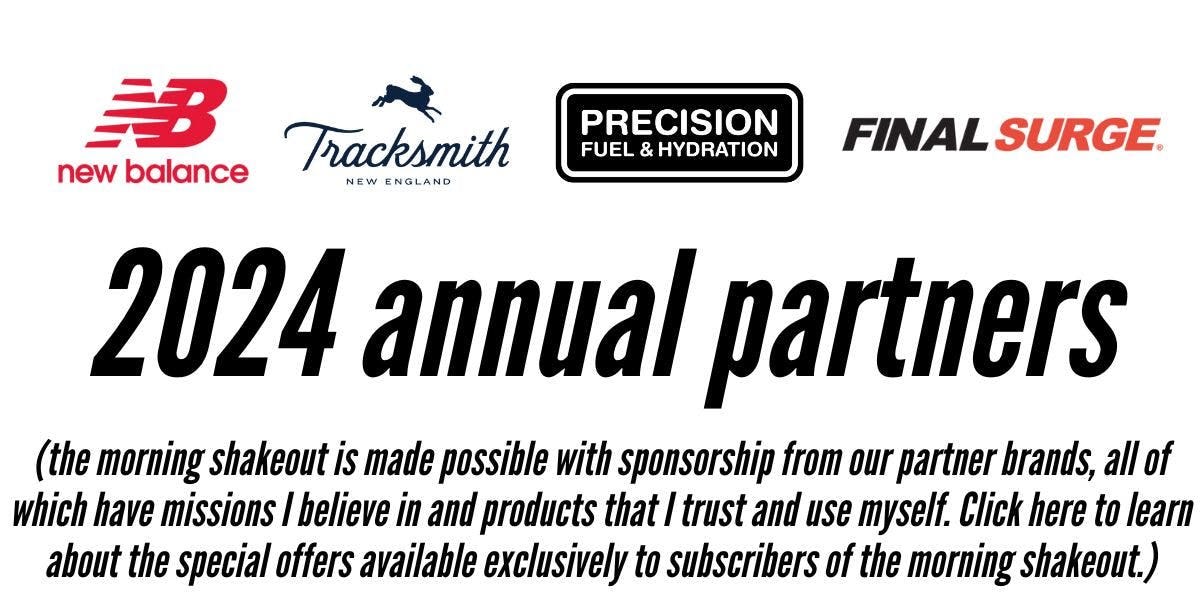the morning shakeout | issue 463
Mammoth Trailfest, the "best way" to do things, science-based training, and a lot more.

Good morning! We got back from vacation a week ago and a couple days later I took off to Mammoth Lakes for the weekend to support a couple of my athletes at the Mammoth Trailfest, Paddy O’Leary, who raced in the 26K on Sunday, and Tim Tollefson, who hosted the three-day mountain party for a few thousand people. It’s been nothing short of incredible to watch this event grow over the past few years and I couldn’t be more proud of Tim for making his dream a reality, one which now sells out across three days of racing over different distances, draws internationally competitive fields, and brings so much energy and joy to his local community. Tim’s a hell of an athlete (and he’s still got some unfinished business of his own on the trails!) but I am telling you that this event is going to be his legacy in the sport. A lot of folks know him for his running accolades, or his many years working as a physical therapist, or his never-not-perfect quaff of hair, but Tim’s true gift is his creativity. It’s been a lot of fun watching him scratch that itch to make something out of nothing with trailfest: dreaming up a unique off-road experience in the Eastern Sierra, coming up with some super-cool branding, sketching out some spectacular (and challenging!) race courses, putting together a kickass website, designing fun bibs, sewing together unique pieces of apparel, pulling together livestream coverage, imagining on-course (and off-course, for what matter) experiences you don’t really see anywhere else, and a whole lot more that you just had to soak in for yourself on the ground. All the details were dialed and it’s clear to me that this is what Tim was meant to do. (Please revisit the above photo if you need to see some evidence for yourself.) I’ll continue to attend trailfest every year that my schedule allows and I’d encourage anyone who lives trail culture (or is even just trail-curious) to do the same: come for a breathtaking race experience (this is quite literally true, as most of the races top out just over 11,000 feet), but stay for the community, the steady stream of good vibes, and yes, the donuts.
OK, I’ve got some good stuff to share with you this week. Let’s get right to it.
Quick Splits
— Nikki Hiltz has had a hell of a past couple years on the track, culminating at this summer’s Olympics in Paris where the 29-year-old advanced to the finals of the women’s 1500m. This short Track & Field News profile does a nice job of capturing what I believe makes Hiltz so fun to watch on the track: they simply love to race. “Winning has always been what’s motivated me,” Hiltz says. “There’s no feeling like breaking the tape. Racing is the really fun part of my job. The past few years I’ve had to convince myself that the training and the grind of the long run and all that stuff can be fun. But I’ve never had to learn the fun in racing.” (Reminds me of one of my favorite quotes from John L. Parker Jr.’s Once A Runner: “Racers express little enchantment with training.”)
— This is a solid piece from David Lipman on evaluating and choosing “the best method” for a chosen pursuit, which applies just as well whether you’re talking about training for a running race or arguing about how to brew your coffee. A few years ago in running it was all about critical velocity workouts. Many years before that it was LSD. Hard intervals have had more than a few days in the sun. (“Easy” intervals even had a couple, too.) Today double-threshold is all the rage. Something else will take the wheel soon, I promise you. None of it is necessarily wrong, but understanding what’s going to be best for you takes a bit of work to figure out. “Don’t go jumping onto the latest trend, especially not if it’s been around for less time than it takes for your eggs to go bad in the fridge,” he writes. “When any new method arrives, it is worth spending some time evaluating the underlying principles of the method.”
— I enjoyed this great behind-the-scenes look at Olympic 800m champion Keely Hodgkinson’s training environment from Euan Crumley of Athletics Weekly. From the outside looking in it would appear that Hodgkinson seemed destined for gold at the Paris Games after a string of silver medal performances at major championships in recent years but the truth is things weren’t looking so certain back in January after a return from injury. I chuckled while reading her coaches’ and training partners’ reactions to her fitness, or lack thereof, at the time. (“I’ve known Keely for five years now and I never thought she could be so bad!” said Jenny Meadows, one of her coaches. “Erin [Wallace] was destroying her on the hill.”) But then I smiled a few paragraphs later while reading about how she and her training partners lift one another up on the bad days and there’s no pecking order or pretense when they’re all at practice—it very much seems an all-for-one, one-for-all type of situation, which, to me, is a sign of a healthy situation. “Keely is a celebrity to some people but we don’t see it and she doesn’t see it,” says Meadows. “She doesn’t ever want to think that we would think of her as that.”
— Many thanks to my partners at New Balance for supporting my work this month (and throughout 2024). My go-to shoe for speed workouts the past few years has been the FuelCell Rebel and the latest iteration, v4, has continued to hold down that spot in the rotation in 2024. (I’m already on my second pair.) As fast and fun as carbon-plated shoes can be, it’s important not to be overly reliant on them for all your track sessions, fartleks, hills, and tempo runs. The Rebel v4s allow your feet to do what they want to do while providing plenty of protection underfoot when you’re putting a lot of extra force into the ground. They offer a responsive ride in a flexible, lightweight package that will fit a variety of foot types (n.b. my wider-than-average forefoot really appreciates them!). The FuelCell Rebel v4 is available at your favorite run specialty store or at newbalance.com (men’s sizes here, women’s sizes here).
— I’m not sure how or when I first came across this 30-year-old article on legendary coach Percy Cerutty from Australian Runner Magazine but I’m glad it now lives on the internet and I have it saved offline for regular reference. Written by Tony Wilson, it’s part Cerutty bio and part explainer on how he trained his athletes, which included 1960 Olympic 1500m champion Herb Elliott, amongst other global medalists and record-holders. Cerutty was known as a bit of an eccentric, but he got results and influenced how his athletes lived off the track as much as how they raced on it. And while some of his training methods could be called outdated, Cerutty was arguably ahead of his time when it came to the importance of recovery as a part of the training process, as well as the influence of strength training and a healthy diet on not only performance, but overall well-being and longevity. “He saw a deep thinking mind and a powerful personality as the only factors that can make for the uppermost levels of success,” Wilson writes. “Ceaseless thought and experimentation are what Percy saw as necessary. Cerutty did not believe in half measures. He expected 100 percent commitment from his athletes.”
— Kaleo’s “Way Down We Go” has been a regular installment on many of my playlists the past decade or so but this version, recorded in a volcano, is phenomenal. (Not to mention somewhat chilling, which has nothing to do with the breath you can see coming out of the band members’ mouths as they play.)
— A big thank you (and congratulations!) to my friends at Precision Fuel and Hydration for supporting my work this month and throughout 2024. PF&H were recently named the official on-course fueling and hydration partner of the California International Marathon (CIM), one of my favorites races and home to my (and many others’) marathon personal best. Want to nail your fueling and hydration and/or learn more about what’s on course at CIM on December 8? Get a free personalized plan with their Fuel & Hydration Planner and refine your race nutrition strategy quickly and accurately. Want to get faster for CIM? Check out this video we made together that goes over the what, why, and how of track workouts, whether you’re a speed work rookie or a seasoned veteran of the oval. (And if you’re interested in trying PF&H products for yourself, check out this link and save 15% off your first order.)
Workout of the Week: The Reverse Michigan
I first wrote about The Michigan workout several years ago for Competitor.com. That article now lives in Outside’s Running category—you can read it here—but the gist of the session is that it blends a set of descending intervals on the track (each one gets a little shorter and a little faster) with longer stretches of steadier tempo running off the track. It’s a great mix of strength and speed that can be beneficial to nearly any runner whether they’re training for the mile, the marathon or anything in between. “This is something that is very unique,” legendary Michigan coach and creator of the workout, Ron Warhurst, told Lope magazine a few years ago. “It’s not just an interval session. This gives the athlete an opportunity to explore where his or her head is at. Where their emotions are. When the grinding starts, it tests your mettle.” A couple years ago I got the idea to assign some of my athletes what I call a “Reverse Michigan,” where we’ll do an ascending ladder on the track—starting with a fast 400m, ending with a strong mile—interspersed with longer stretches of tempo running off the track between intervals. At the end of the day, the Reverse Michigan is the same volume of total work at the same range of intensities—just distributed a little differently than the classic version—but it provides some unique benefits of its own. Here are the details.
The bottom line.
"Don’t try to be original. Be simple. Be good technically, and if there is something in you, it will come out."
—Henri Matisse, French visual artist
That’s it for Issue 463. If you’d like to support the shakeout, please forward this email to someone who might enjoy it or post the web link in a high traffic area of the internet where others can check it out. (And if you’re seeing this newsletter for the first time and want to receive it for yourself first thing every Tuesday morning, you can subscribe right here.)
Thanks for reading,
Mario






